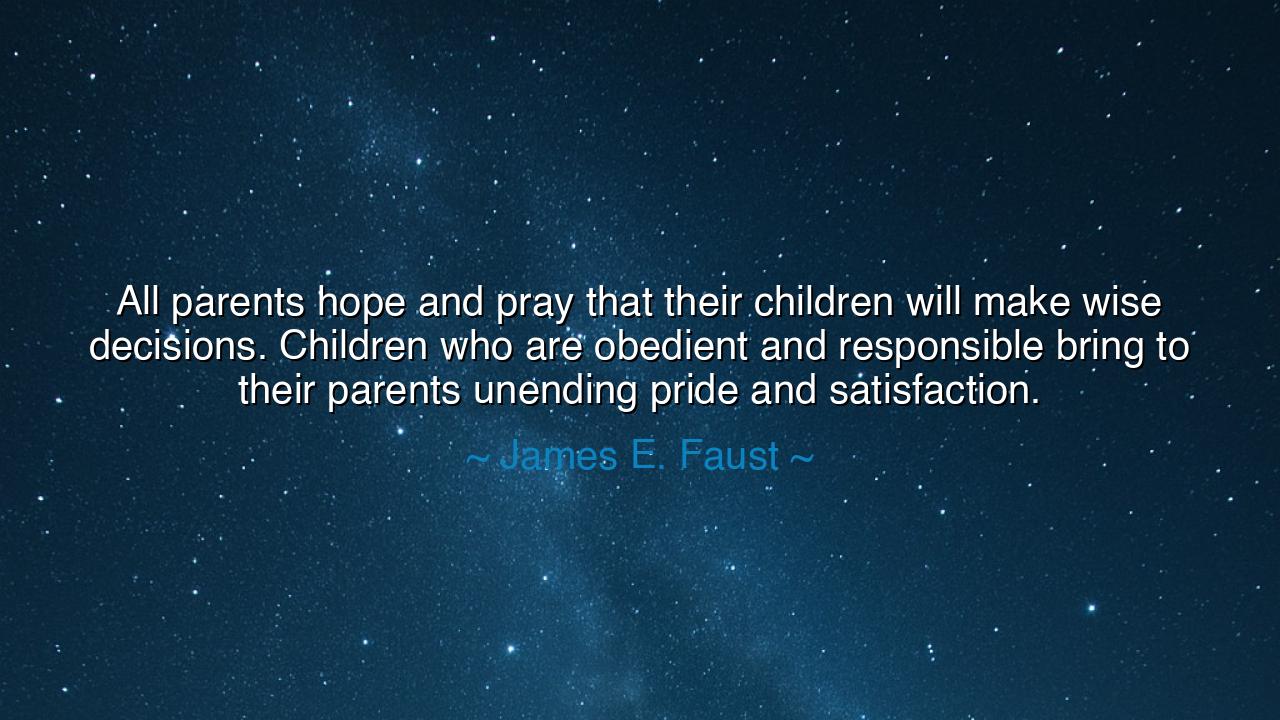
All parents hope and pray that their children will make wise
All parents hope and pray that their children will make wise decisions. Children who are obedient and responsible bring to their parents unending pride and satisfaction.






James E. Faust once declared: “All parents hope and pray that their children will make wise decisions. Children who are obedient and responsible bring to their parents unending pride and satisfaction.” These words, though simple, carry the weight of eternal truth — the truth that binds generations together in love, sacrifice, and faith. Faust, a man of deep spiritual insight and moral wisdom, spoke not only of family but of the divine design of human life: that the relationship between parent and child is both a test and a reflection of the sacred order of heaven and earth.
In these words, Faust reveals that parental love is not born from perfection, but from hope. Every parent, regardless of wealth or station, carries the same dream — that their children will walk the path of righteousness and wisdom, that they will choose the light over the darkness, and that they will live lives of meaning and virtue. Yet this dream is not enforced by power, but nourished by prayer. A parent cannot command a child’s soul; they can only guide, teach, and then trust. Thus, the hope and prayer of the parent become the holiest labor — a quiet offering of the heart that never ceases, even when the child has grown beyond their reach.
The obedience and responsibility Faust speaks of are not blind submission, but the fruit of understanding. When a child is obedient, it is not to please out of fear, but out of love and gratitude. Responsibility, in turn, is the measure of maturity — the recognition that one’s actions carry weight, that choices ripple beyond the self. A child who learns these virtues does more than honor their parents; they honor the very order of life itself. Such a soul becomes a wellspring of peace, a mirror of their parents’ sacrifice, and a source of joy that never fades.
History is filled with such examples. Consider Susanna Wesley, the mother of John and Charles Wesley — founders of the Methodist movement. She bore nineteen children, and though many died in infancy, she poured her faith and discipline into the hearts of the living. She taught them to pray, to read, to think, and to choose the good. Her sons grew to change the world with their words and faith. Yet she herself never sought glory. Her reward was not fame but the quiet satisfaction that her sons walked the path of God. In her patience, she embodied Faust’s vision — the parent whose prayer became a generation’s light.
Faust’s wisdom also speaks to the sacred balance between freedom and guidance. Parents can shape the soil, but they cannot force the seed to bloom. The wise parent gives instruction, but also allows space for choice — for without choice, there can be no true virtue. Likewise, children must understand that obedience is not weakness, but harmony; not submission, but strength. It is the willingness to learn before leading, to listen before speaking, and to remember before forgetting the love that raised them.
But this truth is not only for families — it is a reflection of the greater relationship between humanity and God. We are all, in a sense, His children. He hopes we will make wise decisions, and when we act with righteousness and responsibility, we bring Him joy. Yet He grants us agency — the freedom to err, to learn, to rise again. Thus, the pattern of the family is the pattern of eternity: love gives freedom; freedom gives growth; and growth gives joy.
So let the lesson be this: parents, do not cease to hope, and children, do not forget to honor. Parents, guide with patience, not fear; children, walk with integrity, not rebellion. Each act of obedience, each wise decision, is a blessing returned to those who first loved you. And when you succeed, remember — your success is not yours alone; it is the fulfillment of your parents’ prayer, whispered through the years, lifted like incense to the heavens.
For truly, James E. Faust spoke the eternal harmony of life itself: parents live in hope, and children bring that hope to bloom. And when a child walks in wisdom and grace, the hearts of their parents are comforted — not because they have achieved greatness, but because they have become good. And in that goodness, there is unending pride and satisfaction, the quiet joy that binds every generation beneath the gaze of Heaven.






AAdministratorAdministrator
Welcome, honored guests. Please leave a comment, we will respond soon